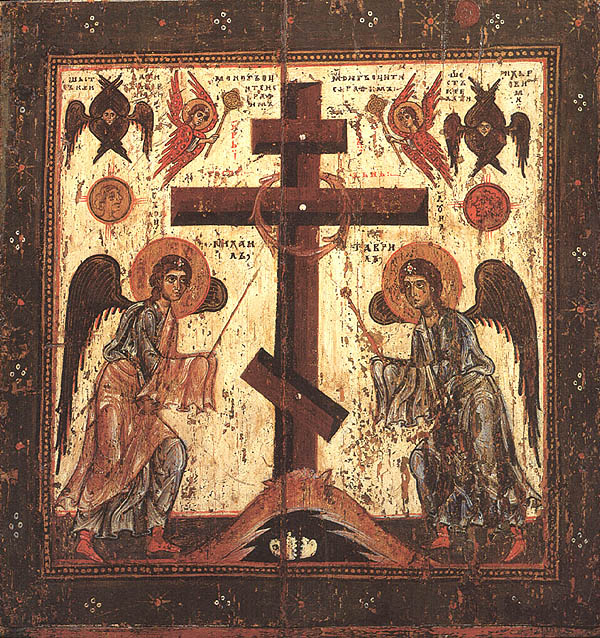- Home
- About us
- Students
- Courses
- Research
- Library
- News & Events
- Gallery
- Contact
- Our Blog
Latest News

Sermon for the Veneration of the Cross
3rd Sunday of Lent (Mk 8:34-38, 9:1)

by Assoc. Professor Philip Kariatlis (Sub-Dean)
At the heart of Holy and Great Lent, the Church places before the faithful, ‘the precious and living giving Cross’ of Christ, inviting us all to come before it and to venerate it, which essentially means to revere, to honour, but also to embrace it wholeheartedly and with fervour, in our daily life. On this, the 3rd Sunday of our Lenten journey, we pause to reflect on the mystery of the Cross, not only to be supported and strengthened as we endeavour to complete the forty-day pilgrimage that we began some weeks ago, but also to come to really appreciate its centrality for Lent but, more broadly, for our day-to-day life. Indeed, as we reflect upon on the mystery of the Cross on this Sunday, there are at least three fundamental points that come to mind with regards to why the Church, in all her wisdom, is specifically inviting us on this day, midway through Lent, to focus our attention on the Cross.
Symbol of Joy and Life
Firstly, the Cross, for all Christians, is a symbol of joy and life. On this day in the Church, we sing: “now the tree of the Cross, bearing the garment of life… fills the world with every joy.”[1] Furthermore, at every Sunday service, the Church reminds us: “for behold, through the Cross, joy has come into the world.” And the Cross is indeed joy and life to the extent that Christ’s death on the Cross is precisely that event which anticipates the resurrection. In one of the hymns of the Sunday Orthros service, we refer to the Cross as the precursor of our Lord’s resurrection: “This is the day of the veneration of the Precious Cross,” we sing, “it is now brought before us, shining with the brightness of Christ’s Resurrection.” Formerly, the Cross was a most brutal instrument of torture and defeat, now it has become an invincible weapon of victory and joy that surpasses all understanding; formerly, a most scandalous form of death and bondage, now, a most striking symbol of life and freedom, of renewal and eternity. As a precursor to Christ’s resurrection, the Cross is that which neutralises death and takes it captive; it is through the Cross that the entire world is renewed; and through it, we are led into the unfading light of the risen Christ and his eternal kingdom. This is why the Cross is our joy!
Indeed, as a joyous symbol, and a compelling sign of God’s inestimable love for the world, the Church’s invitation to venerate the Cross, is therefore very timely as we are called to renew our efforts at this point of our journey. Not only is the Cross offered at our journey’s midpoint, for some respite and encouragement, but also for a brief celebratory interlude. “Today” we sing “there is joy in earth and heaven for the sign of the Cross is made manifest to all the world.” And it is for this reason that another hymn from the Orthros Service invites us “to dance and sing to the music of the harp today, and greatly rejoice at the veneration of the Cross.”[2] We venerate, and we celebrate the Cross, because in beholding it, as Christians, we do not see death and captivity, but quite the opposite, we behold life and freedom. We see the Cross as the crowning moment of Christ’s ministry—remember, it is on the Cross that our Lord uttered the words ‘τετέλεσται’—it is now perfected! (cf Jn 19:30). The Cross, therefore, is our comfort and consolation; our joy and jubilation; but more than that, our life and resurrection!
Symbol of Love
Not only is the Cross a symbol of joy and life, to the extent it heralds the Resurrection of Christ and His victory over death—and by extension, our invitation to such life in all its fullness—but the Cross also represents Christ’s selfless sacrifice on the Cross as the most striking and compelling reminder of God’s boundless love for the world. Christ Himself said: “No one has greater love than this, to lay down one’s life for one’s friends” (Jn 15:13). Reminded of his love, but more than this, reminded of the potency of Christ’s love—a love formidably more powerful even that death itself—the Cross is Christ’s glory and honour, since it is through Christ’s love for the world, the most perfect expression of which is the Cross, that death was destroyed; that the ancient curse was expelled, that Hades was embittered and our true life in Christ secured. Given the opportunity, at this juncture in time, to be reminded of the immense power of the Cross as a symbol of love and the fullness of life—namely, its pivotal role in uniting heaven with earth; God’s heavenly kingdom with the world—the hope is that our efforts will be strengthened; our determination renewed; and our tenacity reinforced as we now seek to embrace the reality of the Cross in this second half of our Lenten journey.
Renewed and invigorated at venerating the Cross and reminded of the joy, the love and fullness of life that awaits us on the day of the Resurrection, the Gospel assigned on this day invites us, in freedom—no one can ever be compelled—to follow the example of Christ in taking up our own respective cross as well. A question which arises, however, is: what does it mean to embrace the reality of the Cross into our life? What does it mean to ‘take up’ our Cross and follow Him?
The response to this question is given in today’s Gospel reading.
An invitation to follow
On this Sunday, we will hear the familiar words of Christ which were conveyed to his disciples before His impending Passion and Crucifixion: “If any want to become my followers, let them deny themselves and take up their cross and follow me.” (Mk 8:34). The verse makes it very clear that if we freely wish to follow Christ, then our life will invariably include ‘taking up’ our own personal crosses—that is, life’s difficulties and challenges—that will inevitably come our way. It could not be any other way: if the life of Christ included the Cross, then those who wish to follow Christ must take up their cross as well. If the Cross of Christ was freedom from the shackles of death, so too for us, ‘taking up our cross’ in life is our way towards freedom—freedom from death. The call, therefore, is to strive to face our crosses with courage and decisiveness, without complaining about it or, worse, feeling self-pity or self-loathing.
If we further ask, however, what ‘taking up our cross’ may mean, the answer is given in the following verse: “those who lose their life for my sake… will save it” (Mk 8:35).
Very often when reflecting on the need to take up our own personal cross in life, it is often said that this signifies: the need to take up our own personal ‘spiritual’ struggle to overcome the sinful passions and worldly desires that may dominate our soul; the need to deny or purify ourselves from all materiality which may hinder our soul’s union with Christ—as if the material world was inherently evil. Without, in any way underestimating the need to take the difficult and arduous road towards our own personal integrity and wholeness—that is, becoming fully and truly human which will entail our own personal ascetical struggle—the meaning of ‘taking up’ one’s cross primarily means abandoning my self-centredness and opening myself up to my neighbour, to their anxieties and problems. You see, the first meaning, runs the risk of being totally focused on oneself, rather than people around us, let alone God. It runs the risk of understanding the cross as a denial of materiality—our materiality—so that we can attend to the spiritual needs of our soul, as if our purpose in life was to become ‘bodiless’ angels.
We often forget that in Christianity, perhaps, unlike other faiths, we are all called towards salvation together with those around us; we can never be saved alone, but only in and through our neighbour. It is precisely for this reason that ‘taking up your cross’ means striving primarily in life, in the name of love, to focus our attention on helping others through whatever needs, through whatever challenges they may be experiencing. ‘Taking up your cross’ means freely choosing to focus our attention, our existence, even if it means ‘losing ourselves’, to the needs of our neighbour in the name of love —whoever this person may be: a work colleague, a friend, a family member, a spouse, and the list could go on. That is to say, in the name of Christ and our experience of his love for us, we deprive ourselves, for the sake of the other, knowing very well that this goes against the grain of what society may consider to be plausible and logical.
Beyond looking out for the needs of others in the name of love, ‘taking up our cross’ may also mean not turning a blind eye to any falsehood, or to any injustice and corruption that we may see around us—especially when this involves people who may have falsely been accused—but rather standing up for such people, not ‘washing our hands’ as Pilate did, not allowing evil to prevail, even though this may end up being at a great cost to us. However, we are assured that if we do this, Christ will forever be with us, the One for whom we truly yearn for all eternity!
Essentially, taking up your cross means taking up the struggle to become more ardent in love for others and all of God’s creation. Herein lies the meaning of Christ’s words, ‘those who lose their life for my sake’, namely those who are willing to assume their cross, namely, those who seek to acquire an unconditional openness to all people and all creation, are those who will save their life; are those for whom the Cross will be a ladder stretching towards eternity; towards God’s kingdom, towards the fullness of life. And so, entrusting ourselves and indeed our whole life to the Cross of Christ may we also be able to chant together with the Church: “We venerate your Cross, O Master, and we glorify your Resurrection”!



.png)